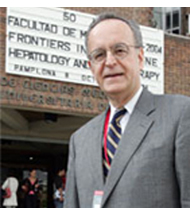Two out of three liver transplant recipients return to their normal work within one year.
Dr. Jorge Rakela (Mayo Clinic, Arizona) speaks at the symposium on Gene Therapy and Hepatology at the University of Navarra.

"Two out of three liver transplant patients return to their normal work within a year. And this is the best marker that their quality of life is normal if there are no medical or surgical problems." This was stated by Dr. Jorge Rakela, professor and head of department of Internal Medicine at the Mayo Clinic in Arizona. The expert was speaking at the symposium on "Frontiers in Hepatology", held at the University of Navarra on the occasion of the fiftieth anniversary of the School of Medicine.
To avoid harmful effects on health, he recommended drinking no more than one or two glasses of wine at meals and, at most, four a day. "The harmfulness of a drink depends on its Degree of alcohol. No more than 30 grams of this substance should be consumed per day, although the figure depends on the culture of each country."
He also warned about the relationship between drugs and liver disease. Specifically, he referred to cocaine, of which he explained that "it causes a subject of hepatitis, as it causes a contraction of the blood vessels that does not allow sufficient blood to reach that organ. In addition, chronic ingestion of this drug causes irritation of the mucous membranes and continuous bleeding. If among several people who take it there is one infected by hepatitis C or AIDS, it can infect the others through the instrument with which they "snort", contaminated by the blood of the sick person".
The "revolutionary concept" of the CIMADr. Jorge Rakela bet on the Education of young people with respect to drugs and also to alcohol. He insisted that "many do not learn to drink socially, on special occasions, but drink large quantities. In addition to the fact that it can lead to cirrhosis, it is an addiction problem. Even when diseases do not develop, there is a psychological and physical dependence". He also emphasized that people with a family history of alcoholism should be especially cautious, as there may be a predisposition Genetics.
On the other hand, the expert praised the "revolutionary concept" put forward by research center Applied Medicine. "It demands by definition that basic researchers have as goal the well-being of patients and offer better therapies. I have been very impressed, because at the Mayo Clinic we have the same goals: our orientation is directed at solving patients' problems. That's how 'cross-fertilization' happens."
Finally, he explained some aspects of the programs of study that are being carried out by some groups of scientists on the use of adult stem cells as an alternative to pancreas transplantation. According to him, "there is programs of study that shows that this therapy would prevent the patient from using insulin. It is a less drastic process than pancreatic transplantation, although it is an experimental procedure that has not yet been disseminated among scientists".
